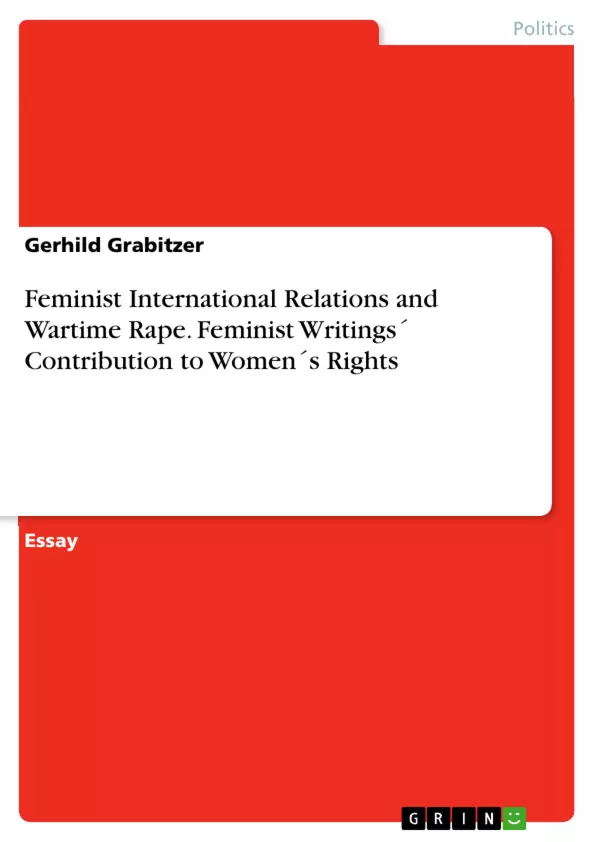The goal of this essay is to examine feminist contributions to international relations theory in the context of wartime rape.
In the first part of this essay, the author will discuss what feminist IR theory can be and what it means in this piece. In order to evaluate feminist contributions, it is necessary to lay out some groundwork. Therefore she will then go on to outline the gendered violence that happened during the Bosnian war and will also explain some of the moral-theory that dominates certain IR theories, because questions of humanity are questions of morals.
Concluding this essay, the author take a look at international legislature concerning this topic, seeing how surprisingly enough, it is very close to some schools of IR theory specifically Realism. Before doing so, she will then put feminist IR theory in relation to mainstream IR theory against the background of wartime rape in Bosnia, although she touches upon this throughout this piece.
Inhaltsverzeichnis (Table of Contents)
- INTRODUCTION
- FEMINIST IR THEORY
- GENDERED VIOLENCE DURING THE BOSNIAN WAR
- IR THEORY AND MORALITY IN THE CONTEXT OF MASS RAPES
- INTERNATIONAL LAW AND MASS RAPE
- FEMINIST IR IN RELATION TO MAINSTREAM IR
- CONCLUSION
Zielsetzung und Themenschwerpunkte (Objectives and Key Themes)
This essay aims to explore feminist contributions to international relations (IR) theory in the context of wartime rape. Specifically, it examines the role of gendered violence during the Bosnian War, analyzes the implications of different IR theories regarding moral frameworks and mass rape, and investigates how international law addresses the issue of wartime sexual violence.
- Feminist IR theory and its various approaches
- The impact of gendered violence in the Bosnian War
- Moral implications of different IR theories, particularly realism and liberalism
- The intersection of international law and feminist IR theory in addressing wartime rape
- The limitations and potential of international law in protecting women from sexual violence
Zusammenfassung der Kapitel (Chapter Summaries)
- INTRODUCTION: This chapter provides a brief overview of the essay's goals and its focus on examining feminist IR theory in the context of wartime rape. It outlines the essay's structure, which will explore the various branches of feminist IR theory, analyze the gendered violence of the Bosnian War, and investigate the relationship between IR theories, morality, and international law.
- FEMINIST IR THEORY: This chapter delves into the complexities of feminist IR theory, highlighting its various branches and epistemological approaches. It discusses the distinction between feminist IR theory and mainstream IR theories, and examines the evolution of feminist IR theory from liberal to post-positivist perspectives.
- GENDERED VIOLENCE DURING THE BOSNIAN WAR: This chapter focuses on the specific case of genocidal mass rapes in Bosnia during the Bosnian War, highlighting the systematic nature of the violence and the role of rape as a weapon of war against Bosnian women. It examines the societal and political context of the war, the motives behind the mass rapes, and the enduring consequences for victims.
- IR THEORY AND MORALITY IN THE CONTEXT OF MASS RAPES: This chapter analyzes the moral frameworks underlying different IR theories and their implications for understanding and responding to wartime rape. It contrasts the realist perspective of state-centric self-interest with the liberal internationalist emphasis on individual freedom, peace, and justice. It also examines the potential limitations of realist perspectives in addressing issues of sexual violence.
- INTERNATIONAL LAW AND MASS RAPE: This chapter explores the intersection of international law and feminist IR theory in addressing wartime rape. It examines the limitations of traditional international law in protecting women's rights and interests, particularly concerning sexual violence. It also discusses the potential for international law to evolve in a more inclusive and responsive manner, taking into account feminist perspectives.
Schlüsselwörter (Keywords)
This essay focuses on the intersection of feminist IR theory, wartime rape, and international law. Key concepts include gendered violence, the Bosnian War, moral frameworks, realism, liberalism, international law, and the limitations and potential of international law in addressing wartime sexual violence.
Frequently Asked Questions
What is Feminist International Relations (IR) theory?
Feminist IR theory examines global politics through a gendered lens, highlighting how traditional IR theories often ignore the experiences of women and the impact of gender hierarchies on international security.
How was rape used as a weapon in the Bosnian War?
In the Bosnian War, mass rape was used systematically as a tool of ethnic cleansing and genocide to humiliate, traumatize, and destroy the social fabric of targeted communities.
How does Realism differ from Liberalism regarding wartime rape?
Realism often views such violence as a "side effect" of war or state interest, while Liberalism emphasizes individual rights, justice, and the role of international institutions in protecting victims.
What are the limitations of international law in addressing sexual violence?
Historically, international law was state-centric and often failed to recognize rape as a war crime or act of genocide, though feminist contributions have pushed for significant legal reforms.
Why is gendered violence a central concern for Feminist IR?
It reveals that security is not just about state borders but about the physical safety of individuals, showing how patriarchal structures perpetuate violence during conflicts.
- Citar trabajo
- Gerhild Grabitzer (Autor), 2019, Feminist International Relations and Wartime Rape. Feminist Writings´ Contribution to Women´s Rights, Múnich, GRIN Verlag, https://www.grin.com/document/495457



